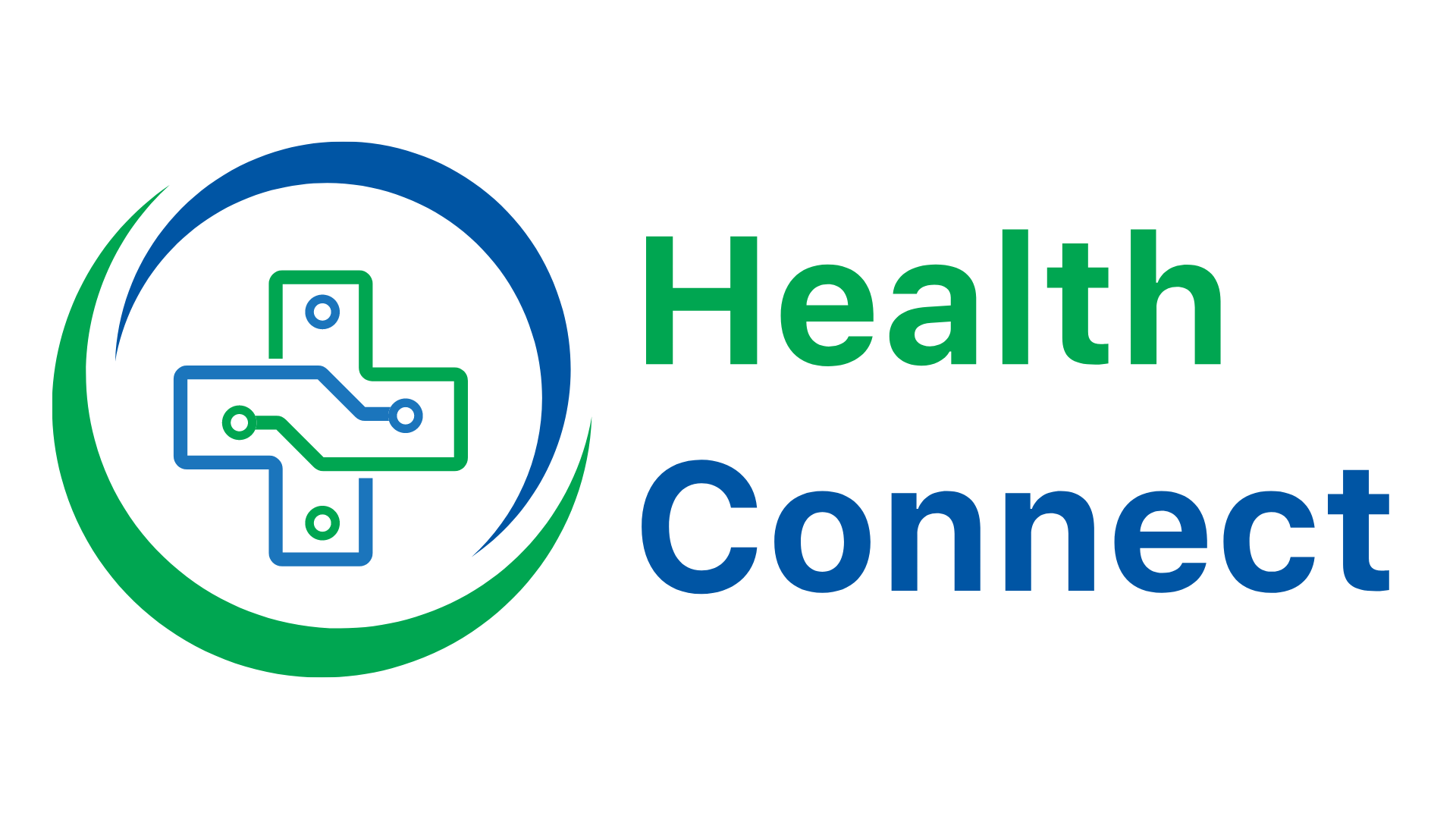




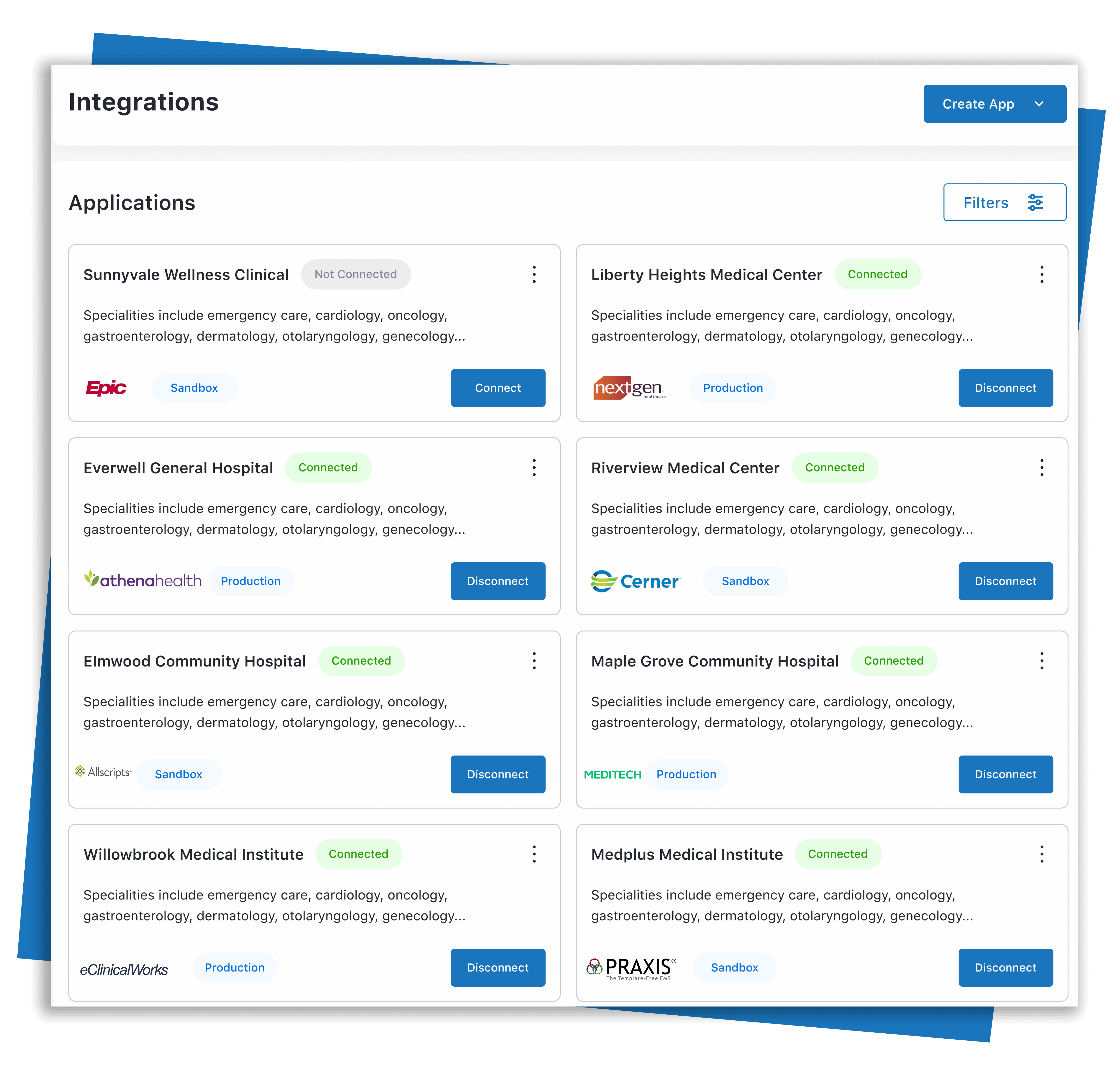
Our expert team handles all technical aspects to seamlessly integrate HealthConnect CoPilot with your existing tech stack. We ensure smooth and secure data exchange between EHRs and other software and devices to:
- Integrations – Streamline EMR and EHR Integration which includes EPIC, Cerner, Athena Health, and other platforms.
- Patients – Patient management system for easy access to patient information, history, and engagement tools.
- Practitioner – Manage practitioners’ schedules, tasks, and communications to optimize healthcare delivery.
- Medications – Track patient medications and refills with seamless integration to e-prescribe services.
- Appointments - Efficient appointment scheduling and management system to optimize clinic workflow and patient scheduling.
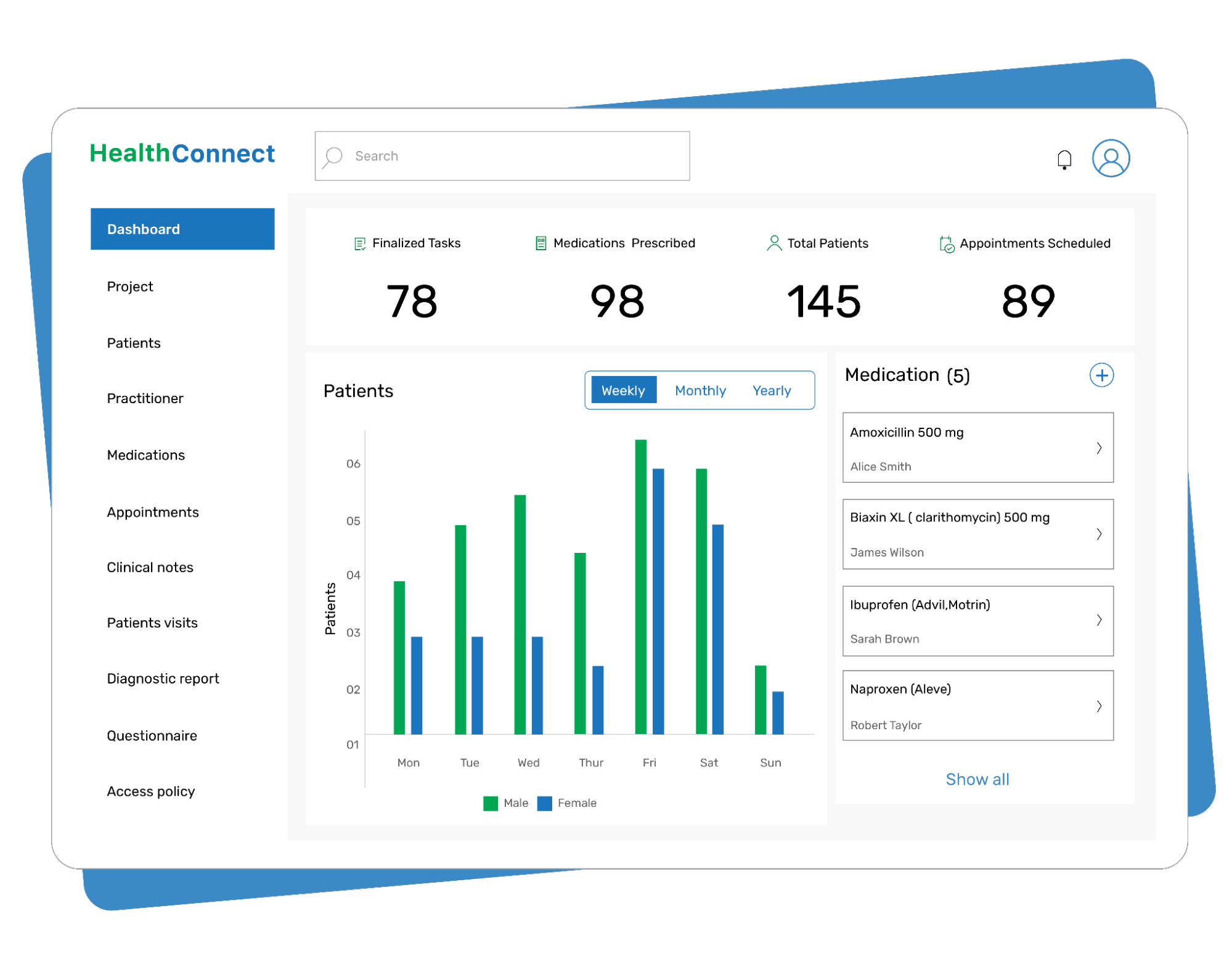
Unified Data Access Provide easy access to patient data stored across diverse EHR platforms through a unified interface.
Role-Based Control Implement role-based access control to restrict access to sensitive patient information and ensure data security.
HL7 Standard Ensure compliance with HL7 standards for efficient data exchange and interoperability between healthcare systems.
FHIR Hosted Empower your data management by hosting your own FHIR server, ensuring effective data management through systems.
HIPAA Compliance Commitment to robust data security and patient privacy in adherence to HIPAA standards.
Scalable Integration Deliver solutions that adjust to your company's changing data needs, volume and complexity.
Customer Satisfaction Rate
Faster Time-to-Market Delivery
Messages Processed Daily Volume
Reduction in Development Hours
Integration Cost Savings

Population Health Management - Payers analyze aggregated patient data from EHR systems to identify population health trends, risk factors, and disease prevalence, informing targeted interventions, preventive care strategies, and wellness programs. Patient Eligibility Verification - Payers utilize EHR data for real-time insurance eligibility verification, streamlining prior authorization workflows and reducing claim denials. Integration with payer systems ensures accurate patient coverage details and enhances efficiency in processing claims and prescriptions. Value-Based Care and Reimbursement- Payers incentivize providers to deliver high-quality, cost-effective care by linking reimbursement to patient outcomes, satisfaction scores, and adherence to evidence-based guidelines, leveraging data from EHR systems to measure performance. Fraud Detection and Claims Processing - Payers use data analytics and machine learning algorithms to detect fraudulent claims, identify patterns of abuse or over utilization, and streamline claims processing, enhancing operational efficiency and reducing financial losses. Patient Health Outcomes and Risk Management Payers assess patient health outcomes, risk profiles, and healthcare utilization patterns using EHR data, enabling proactive risk management, care coordination, and resource allocation to improve health outcomes and reduce costs.

Remote Patient Monitoring (RPM) - Providers can use wearable devices to remotely monitor patients’ vital signs and health metrics, enabling proactive intervention and management of chronic conditions. Clinical Decision Support (CDS) - Providers leverage patient data stored in the EHR system to receive real-time clinical decision support, such as alerts for drug interactions, evidence-based treatment recommendations, and risk assessments. Telemedicine and Virtual Consultations - Healthcare providers conduct virtual consultations with patients, accessing their EHR data to inform diagnosis and treatment decisions, while also ensuring secure communication and information exchange. Precision Medicine and Personalized Treatment Providers utilize patient genetic and molecular data to tailor treatment plans, therapies, and medication regimens based on individual patient profiles, enhancing treatment efficacy and minimizing adverse effects. Medical Imaging and Diagnostic Tests Providers store and access medical images and diagnostic test results within the EHR system, facilitating timely diagnosis, treatment planning, and collaboration among specialists. Care Coordination and Collaboration: Healthcare teams collaborate and share patient data, care plans, and treatment recommendations within the EHR system, ensuring seamless care coordination, continuity of care, and improved patient outcomes.

Access to Personal Health Records (PHR) Patients securely access their EHR data, including medical history, test results, and treatment plans, empowering them to actively participate in their healthcare decisions and self-management. Patient Education and Engagement Patients receive personalized health education materials, treatment reminders, and lifestyle recommendations based on their EHR data, promoting health literacy, adherence to treatment plans, and proactive health management. Remote Monitoring and Self-Tracking - Patients use wearable devices and mobile health apps to monitor their health metrics, track symptoms, and report outcomes to healthcare providers, fostering self-awareness and engagement in their health journey.

A leading provider of customizable display solutions

Top Provider for Customized Healthcare Solutions for Better Patient Results

AI-enhanced obstetrics clinical decision support platform
Initial Consultation: 1 Week Conduct an in-depth consultation to understand the client’s specific needs, goals, and existing systems. Identify key stakeholders and establish communication channels.
Requirement Gathering: 1 to 2 Weeks Collect integration requirements, including data sources, functionalities, and security considerations. Collaborate with clients to prioritize features and set project milestones.
System Analysis & Design: 2 to 3 Weeks Assess client systems for integration points and compatibility. Design a customized solution based on requirements, defining data mapping and security protocols.
Development and Testing: Timeline depends on the solution Develop the integration solution using industry-standard protocols such as FHIR. Rigorously test the solution in a controlled environment to ensure reliability, scalability, and security.
Deployment: 2 to 3 Weeks Deploy the integrated solution in collaboration with the client’s IT team, ensuring minimal disruption to existing workflows. Provide comprehensive documentation and training to key stakeholders on using the new system effectively.
Maintenance and Improvement Implement monitoring tools for performance, data integrity, and security, providing ongoing maintenance and support. Drive improvement by gathering feedback, identifying enhancements, and staying updated on industry trends.
- Can FHIR standards within HealthConnect CoPilot enable interoperability between different healthcare systems?
Yes, FHIR standards in HealthConnect CoPilot facilitate interoperability between healthcare systems by enabling efficient data exchange through modern RESTful API architecture.
- Does HealthConnect CoPilot integrate with EHR systems like Epic and Cerner?
HealthConnect CoPilot offers robust integration with EHR systems such as Epic and Cerner, leveraging industry-standard protocols like HL7 and FHIR.
- What interoperability standards are supported by you?
We support interoperability standards such as HL7, FHIR, DICOM, and IHE profiles.
- How is the pricing determined for HealthConnect CoPilot?
Our pricing model for HealthConnect CoPilot is based on the number of FHIR (Fast Healthcare Interoperability Resources) resources stored within the platform. This approach allows us to offer flexible and scalable pricing options tailored to the needs of our customers.
- How long does it take to implement HealthConnect CoPilot?
Implementation times for HealthConnect CoPilot vary based on organizational needs. Typically, timelines range from weeks to months, ensuring a smooth deployment tailored to each client. Get a free demo for details.
HealthConnect CoPilot enabled us to access real-time patient health data through integration with Apple HealthKit, enhancing care delivery while maintaining HIPAA compliance. This led to personalized care and improved outcomes for patients.
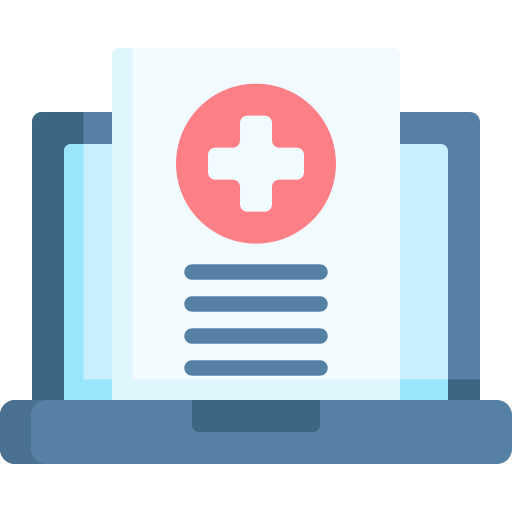
AI-enhanced obstetrics clinical decision support platform
HealthConnect CoPilot's integration with Epic's Hyperspace has transformed our workflow. Automated post-delivery examinations and HL7 protocol use ensure accurate updates to Epic. Their expertise empowers informed decision-making in childbirth
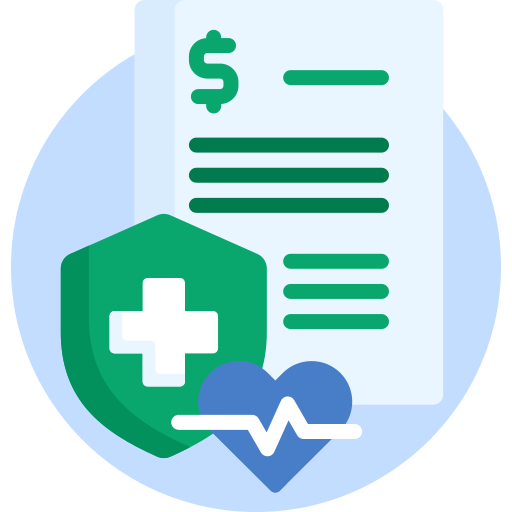
Top Provider for Customized Healthcare Solutions
HealthConnect CoPilot's helped us to integrate with leading tracking devices such as Apple Watches and Fitbit. This integration enables effortless syncing of health data, providing users with real-time insights displayed directly on our flagship products: smart mirrors and digital calendars.
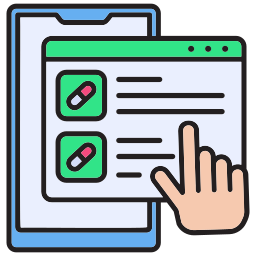
A leading provider of customizable display solutions

